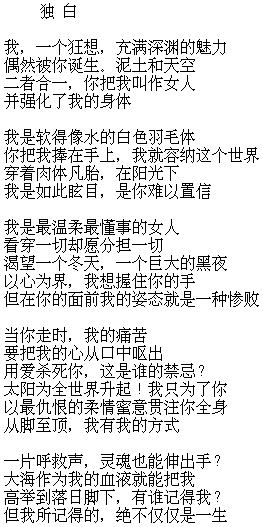
january 2005
CHINA - POETRY
INTERNATIONAL.ORG

Zhai
Yongming
Publications
Nüren (Woman) (poems, 1988)
Zai yiqie meigui zhi shang (Above all the roses)
(poems, 1989)
Zhai Yongming shiji (Selected poems) (poems, 1994)
Cheng zhi wei yiqie (Call it everything) (poems,
1996)
Heiye li de su ge (Plain songs at night) (poems,
1997)
Monologue
I, a rhapsodist, am full of the charm of the abyss
given fortuitous birth by you.
earth and sky
unite as one, you call me
a woman and strengthen my body
I am as soft as the white-feathered body of the water
carrying me in your hands, I hold this world
dressed in a corporeal mortal-embryo, in sunlight
I am bedazzled, although you find it hard to believe
the gentlest, most understanding of women
I have seen through everything yet wish to shoulder my
share
yearning for a winter, an enormous night
heart taken as the world, I want to hold your hand
but before you my pose is one of crushing defeat
when you leave, my pain
vomits my heart from my breast to murder
you with love, whose taboo is this?
the sun rises for the whole of the world!
for you alone I concentrate the most
vengeful tenderness on your whole body
from head to toe, I have means of my own
calls for help, can the soul reach out its hands?
as my blood, the ocean is able to lift me up
to the foot of the sunset, does anyone remember me?
but what I remember is much more than this lifetime
©
Translation: 2004, Simon Patton
I would like to thank Yenney Lai for all her
help with these translations
This Poem was chosen by the
Editor after a brief conversation with a
Chinese man on the London Underground, J.Braddell,editor
SHE SPEAKS FOR ME?. HOWEVER, ON SOME OCCASIONS,when the particulars of a poem flow and permeate, language is monstrously exaggerated, expressing an uncertainty about the system, a dislocation of the existing language. When this happens you have no choice but to respect the implications organised by the language, a language that goes beyond what you are capable of thinking. It is just like music; when the music flows inside you it awakes your limbs and every bone in your body ..... Z.Yongming
Waiting for a Miracle to Happen
Zhai Yongming
In the following undated statement from the 1990s, Zhai Yongming attempts to summarize the most essential aspects of the poetic art as she conceives it.
Poetry is an everlasting yearning for unknowable worlds and unattainable objects.
Poetry is the revision of currently existing language and the rediscovery of that which has already been discovered.
Poetry is a reason some people need to go on living. The place where most people come to a halt is precisely the place from which the poet sets out from. Most people kill time; the poet creates it.
Writing poetry is a process that involves waiting for a miracle to happen. That instant which we strive so hard to get close to is the instant we comply with the will of Heaven.
Poetry will always be a form of inquiry: transcending language, intellect, beauty and even death, it hangs its question marks high up on the brow of time.
A poet needs to be able to evoke intense emotion in herself and in her readers; a good poet has the capacity to control this emotion.
The worth of a good poem lies in this: no matter what angle you look at it or what method you use to make sense of it, it is still, no more and no less, a “good poem”.
A poet concentrates all her passions on a feeling for writing [wenzi qing]. She discovers things of the utmost importance in characters and words invested with ordinary meanings. The rise and fall of the tones of the characters give assistance to the secret games she plays in her heart of hearts, and helps her to deduce the intriguing rhythms of the ineffable.
The poet should be in possession of a sensitivity towards—and an understanding of—words and language that goes beyond that of the average person. In addition, she should demonstrate an ability to judge her own works and those of other poets. As well, she should have a “third eye” [tianyan] that opens when confronted with moments of mystery.
At the same time as the poet writes “prophetic
remarks” for the world, she is also the one being
“prophesied” about through her language.
TRANSLATED: SIMON PATTON